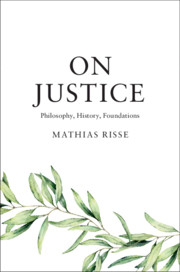Refine search
Actions for selected content:
17 results
3 - The Scholarship of International Law at the Time of the League of Nations
-
-
- Book:
- The Cambridge History of International Law
- Published online:
- 01 May 2025
- Print publication:
- 29 May 2025, pp 68-99
-
- Chapter
- Export citation
12 - Sovereignty
- from Part II - Modalities
-
-
- Book:
- The Cambridge Handbook of Constitutional Theory
- Published online:
- 27 March 2025
- Print publication:
- 24 April 2025, pp 192-207
-
- Chapter
- Export citation
30 - The State
- from Part III. A - The State
-
-
- Book:
- The Cambridge Handbook of Constitutional Theory
- Published online:
- 27 March 2025
- Print publication:
- 24 April 2025, pp 523-536
-
- Chapter
- Export citation
18 - Modern Critics of Democracy
- from Part V - Democracy beyond Modernity
-
- Book:
- Can Democracy Recover?
- Published online:
- 02 January 2025
- Print publication:
- 16 January 2025, pp 180-191
-
- Chapter
- Export citation
Conclusion
-
- Book:
- Ethnos of the Earth
- Published online:
- 12 December 2024
- Print publication:
- 19 December 2024, pp 229-244
-
- Chapter
- Export citation
5 - Nation-State, Islamic State
-
- Book:
- Late Ottoman Origins of Modern Islamic Thought
- Published online:
- 03 November 2022
- Print publication:
- 17 November 2022, pp 189-239
-
- Chapter
- Export citation
5 - Speaking “As If”
- from PART II - Eloquence and the Moderns
-
- Book:
- Words on Fire
- Published online:
- 16 December 2021
- Print publication:
- 16 December 2021, pp 158-183
-
- Chapter
- Export citation

On Justice
- Philosophy, History, Foundations
-
- Published online:
- 18 September 2020
- Print publication:
- 10 September 2020
14 - Value, Stringency, and the Frame-of-Human-Life Conception of the Political
- from Part III - The Grounds of Justice
-
- Book:
- On Justice
- Published online:
- 18 September 2020
- Print publication:
- 10 September 2020, pp 284-305
-
- Chapter
- Export citation
Chapter 6 - Negative Political Theology
-
- Book:
- Hope in a Secular Age
- Published online:
- 31 January 2020
- Print publication:
- 19 December 2019, pp 132-153
-
- Chapter
- Export citation
Part I - The Anti-linear Cold War
-
- Book:
- International Law and the Cold War
- Published online:
- 05 December 2019
- Print publication:
- 19 December 2019, pp 25-78
-
- Chapter
- Export citation
2 - International Law and the Cold War: Reflections on the Concept of History
- from Part I - The Anti-linear Cold War
-
-
- Book:
- International Law and the Cold War
- Published online:
- 05 December 2019
- Print publication:
- 19 December 2019, pp 27-48
-
- Chapter
- Export citation
Introduction
-
- Book:
- Arendt on the Political
- Published online:
- 15 October 2019
- Print publication:
- 24 October 2019, pp 1-8
-
- Chapter
- Export citation
Chapter 2 - Friends and Enemies
-
- Book:
- Interwar Modernism and the Liberal World Order
- Published online:
- 15 August 2019
- Print publication:
- 29 August 2019, pp 46-78
-
- Chapter
- Export citation
The changing face of enmity: Carl Schmitt’s international theory and the evolution of the legal concept of war
-
- Journal:
- International Theory / Volume 2 / Issue 3 / November 2010
- Published online by Cambridge University Press:
- 01 November 2010, pp. 351-380
-
- Article
- Export citation
Generic universalism in world politics: beyond international anarchy and the world state
-
- Journal:
- International Theory / Volume 1 / Issue 2 / July 2009
- Published online by Cambridge University Press:
- 01 July 2009, pp. 215-247
-
- Article
- Export citation
Sense and Quasisense of Schmitt's Großraum Theory in International Law – A Rejoinder to Carty's “Carl Schmitt's Critique of Liberal International Legal Order”
-
- Journal:
- Leiden Journal of International Law / Volume 15 / Issue 1 / March 2002
- Published online by Cambridge University Press:
- 03 March 2004, pp. 53-68
-
- Article
- Export citation
